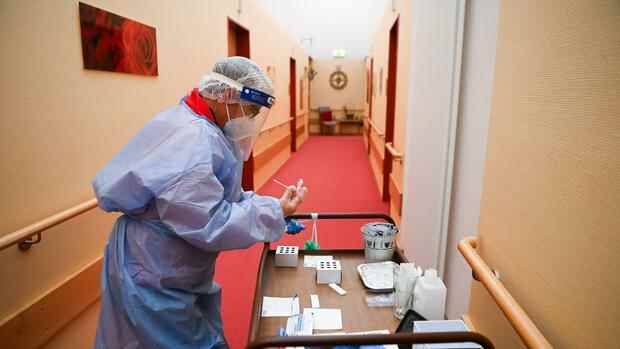Since the health authorities can no longer keep track of contacts, facilities such as nursing homes should be prioritized.
(Photo: dpa)
Berlin In many places, health authorities no longer see themselves in a position to track all contacts of infected people in view of the high number of cases in Germany. “The loads are enormous,” said Ute Teichert, chairwoman of the Federal Association of Doctors in the Public Health Service (BVÖGD), the Handelsblatt. “At the moment it is no longer possible in many places to reach and inform the contacts of infected people promptly,” said Teichert.
Many federal states have therefore foregoed contact tracing, “as we know it so far,” said Teichert. There, people who tested positive for the coronavirus would no longer be routinely contacted by the health authorities.
The Robert Koch Institute (RKI) has been recommending that the health authorities focus contact follow-up on the protection of “people at increased risk of a severe course” since September. These are, for example, old people’s and nursing homes as well as larger outbreaks in schools and other facilities.
Given the situation, more and more countries are now making use of it. The RKI reported a seven-day incidence of 213.7 and 21832 new corona cases on Tuesday.
Top jobs of the day
Find the best jobs now and
be notified by email.
The number of cases is particularly high in the federal states of Saxony with an incidence of 483.7, followed by Thuringia with 439.3 and Bavaria with 348. The RKI also registers a high incidence of 256.9 for Baden-Württemberg. The value in Schleswig-Holstein, on the other hand, has been largely stable for days at 77.
Focus on major outbreaks and vulnerable groups
The number of cases is also reflected in the workload of the health authorities, as described by the responsible health ministries when asked by the Handelsblatt. The situation is particularly dramatic in Thuringia.
The responsible Ministry of Health announced that several counties and urban districts can no longer ensure daily and complete contact follow-up. There are delays of two to three days, in individual cases even more temporarily.
The reason for this is not only the sharp increase in the number of cases, but also staff losses due to quarantine and illness. The Bundeswehr is active in providing support in five districts. In addition, so-called containment scouts would come to the rescue to help with contact tracking. In addition, they want to focus more on vulnerable groups in the future.
Countries such as Baden-Württemberg, on the other hand, announced that the health authorities are already concentrating more on outbreaks, for example in old people’s and nursing homes. Federal states such as Hesse and Hamburg are proceeding in a similar manner. In the Hanseatic city, for example, only daycare centers, schools and nursing homes are “all contact persons without exception”, it is said.
The Ministry of Health in Hesse announced that, in contrast to last autumn and winter, the number of contact persons was many times higher due to the lack of lockdown measures for infected people. “Therefore, extensive follow-up as it was a year ago is neither affordable nor advisable.” Even federal states such as Schleswig-Holstein, in which the number of cases is comparatively low, have now adopted this strategy.
Does the Bundeswehr have to help again?
The situation is different in Bremen. The city-state announced that all contact persons there would still be contacted by telephone and informed in writing within 24 hours. It is said that the company is “currently very well positioned in terms of both personnel and technology”.
The head of the association, Teichert, called for quick help in view of the situation. In regions with a particularly high number of cases, the health authorities need “external support again at short notice – from other offices in local government, from the armed forces or even from medical students,” she demanded. In addition, it would need specialist staff who stay long-term and are trained.
“It is just too slow to attract this staff,” said Teichert. Last year, the federal government passed the pact for the public health service, which will have four billion euros available by 2026 – including for more staff. Despite the budget, the positions are not filled quickly enough – also because payment in the health service is not attractive for many, said Teichert.
The Green health expert Kirsten Kappert-Gonther also sees the problem in the “slow implementation” of the pact. “When filling additional positions, the municipalities urgently need more planning security,” she said. It therefore held out the prospect of extending the provision of federal funds beyond the year 2026. In addition, reinforcements are needed in the health authorities. The Greens have the prospect of governing as part of a traffic light coalition.
The SPD health expert Sabine Dittmar promised to want to discuss short-term support measures in the meeting of the health committee in the coming week. “In addition to the acute situation, it will now be a central task for the future federal government to provide better security for the public health service,” said Dittmar to the Handelsblatt.
More: Record numbers of cases: traffic light parties want 3G at work
